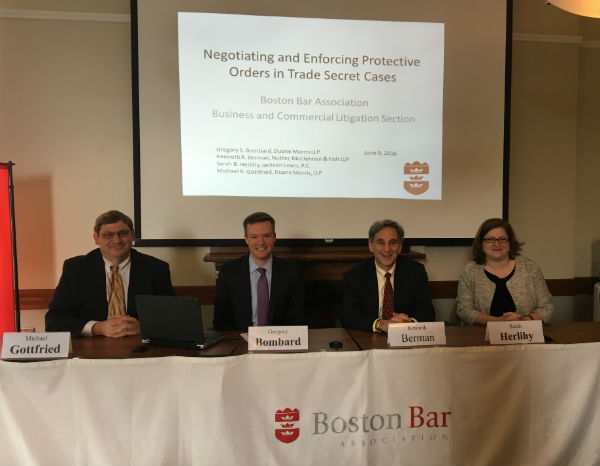By
Shannon Hampton Sutherland, Co-Chair, Duane Morris Non-Compete and Trade Secrets Practice, http://www.duanemorris.com/attorneys/shannonhamptonsutherland.html, and
Corey M. Weideman, Duane Morris Associate, http://www.duanemorris.com/attorneys/coreymweideman.html
On May 20, 2016, in In re: M-I, LLC, d/b/a M-I Swaco, No. 14-1045, 2016 Tex. LEXIS 389 (Tex. May 20, 2016), the Texas Supreme Court issued its much anticipated first decision involving the Texas Uniform Trade Secrets Act (“TUTSA”). TUTSA, which became effective on September 1, 2013, updated Texas law governing trade secret matters by, among other things, providing an unambiguous definition of a “trade secret”, expanding injunctive relief, and authorizing recovery of attorneys’ fees for willful and malicious activity. TUTSA also includes a specific provision requiring trial courts to protect the secrecy of a trade secret through reasonable means. See TEX. CIV. PRAC. & REM. CODE § 134A.006. This section of TUTSA, and the extent to which a trial court must protect the secrecy of an alleged trade secret during an injunction hearing, was the focus of the Court’s attention in In re: M-I, LLC.
In In re: M-I, LLC, the Texas Supreme Court held that the due-process right of a party to have a designated representative present at an injunction hearing involving alleged trade secrets is not absolute, and the trial court abused its discretion when it summarily concluded – without first balancing the competing interests at stake – that excluding the defendant’s corporate witness from portions of the injunction hearing involving trade secrets would violate due process.
The basic facts of the trade secret case underlying the mandamus proceeding in In re: M-I, LLC are typical: an employee with a signed non-compete and confidentiality agreement left his job to work for one of his former employer’s competitors, and a dispute ensued shortly thereafter. The former employer, M-I, filed suit for trade secret misappropriation and sought injunctive relief against its former employee and his new employer, National Oilwell Varco, L.P. (“NOV”). Relying on Section 134A.006 of TUTSA, M-I requested that NOV’s corporate representative be excluded from the courtroom during a portion of the hearing on M-I’s application for temporary injunction. The trial court summarily denied M-I’s request, however, concluding that the exclusion of NOV’s designated representative would be a “total violation of due process.” Instead, the trial court admonished NOV’s representative not to disclose or use anything he heard in the courtroom. Concerned about disclosing testimony regarding its trade secrets to NOV and placing the secrecy of the alleged trade secrets at risk by doing so, M-I postponed the injunction hearing to file a mandamus request with an intermediate appellate court. The intermediate appellate court denied the mandamus request and M-I filed a new mandamus request to the Texas Supreme Court.
Mandamus relief is available, the Court noted, when the trial court abuses its discretion and no adequate appellate remedy exists. The Court first explained that there is no adequate appellate remedy for an erroneous order to disclose a trade secret before examining whether the trial court abused its discretion.
In conditionally granting M-I’s request for mandamus relief, the Texas Supreme Court held that the trial court abused its discretion by summarily refusing M-I’s request to conduct portions of the temporary injunction hearing outside the presence of the NOV’s designated representative. The Court explained that courts have discretion to exclude parties and their representatives in limited circumstances when “countervailing interests overcome [the] presumption” in favor of participation. Rather than summarily denying M-I’s request, the Court explained, the trial court was required, at a minimum, to balance the parties’ competing interests.
- First, the trial court was required to determine the degree of competitive harm M-I would have suffered from the dissemination of its alleged trade secrets to NOV’s corporate representative, including by considering the relative value of the alleged trade secrets and whether the NOV corporate representative was a competitive decision-maker.
- Second, the court was required to determine the degree to which NOV’s defense of M-I’s claims would be impaired by the representative’s exclusion at such a preliminary stage of the proceeding.
Importantly, the Court noted that, “[i]f the trial court conducted the required balancing, it may have been within its discretion to decide that due process required NOV’s designated representative to be present.” The trial court’s error was failing to conduct the balancing at all.
In short, TUTSA plaintiffs should not assume that the court will exclude the other side’s representative when alleged trade secrets are disclosed, and TUTSA defendants should not assume that the court will permit their representatives to participate in all phases of a TUTSA case. The trial court must develop a factual record to balance the parties’ countervailing interests before deciding whether to exclude a witness.

